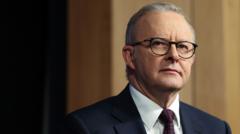In the lead-up to the May 3 election, Prime Minister Anthony Albanese's aspirations for a second term have been complicated by a series of unforeseen challenges. Originally poised to announce an election date, Albanese had to swiftly adapt his plans following the impact of Cyclone Alfred, which deviated focus from a potential positive economic message to managing a national crisis.
Albanese's Path to Re-election Complicated by Unforeseen Challenges

Albanese's Path to Re-election Complicated by Unforeseen Challenges
As the Australian election nears, Prime Minister Anthony Albanese wrestles with unexpected setbacks amidst a turbulent political landscape.
These recent events have been emblematic of his term; promising initiatives often hindered by a litany of difficulties ranging from the cost-of-living crisis to severe climate events. Albanese, who leads the Labor Party, is now at a critical juncture as he faces off against the opposition leader, Peter Dutton of the Liberal Party. The electoral race has tightened, with forecasts suggesting a potential hung parliament due to rising support for independent candidates and minor parties.
Albanese’s initial election victory in May 2022 was framed as a transformative moment following nearly a decade of conservative rule. His government prioritised key issues including climate action, economic stability, and advancing Indigenous rights, with hopes of enacting a historic referendum for an Indigenous Voice to Parliament. However, the proposal faced rejection, with over 60% of voters opting against it, leaving both Albanese and many Indigenous Australians disenchanted.
As the cost-of-living crisis deepened and inflation soared due to post-pandemic economic conditions, voter sentiment shifted. Dutton's campaign capitalised on public discontent with rising interest rates and economic hardship, positioning Labor as out of touch with pressing Australian concerns. While Albanese defends his government against blame for inherited woes, voters are increasingly sceptical about which party can effectively address the myriad of challenges facing the nation.
Despite disillusionment with Labor, many voters are unlikely to pivot towards the Dutton-led Coalition, instead gravitating towards independent candidates. This trend hints at a significant political realignment, as disenfranchised citizens seek alternatives to mainstream politics. Australia's unique electoral system, characterized by mandatory voting and preferential voting, may alleviate extremes; analysts suggest these features help maintain a centrist political landscape.
The looming election is also entwined with global concerns, particularly the influence of U.S. politics under Donald Trump. Dutton argues for a sharper approach to foreign policy, but uncertainty prevails regarding his capability to navigate these turbulent international waters.
With only weeks until election day, Albanese's government finds itself in a precarious position—striving to distinguish its achievements while contending with rising opposition sentiment. As the campaign progresses, Australians are tasked with defining their vision for the future leadership of their country.
Albanese’s initial election victory in May 2022 was framed as a transformative moment following nearly a decade of conservative rule. His government prioritised key issues including climate action, economic stability, and advancing Indigenous rights, with hopes of enacting a historic referendum for an Indigenous Voice to Parliament. However, the proposal faced rejection, with over 60% of voters opting against it, leaving both Albanese and many Indigenous Australians disenchanted.
As the cost-of-living crisis deepened and inflation soared due to post-pandemic economic conditions, voter sentiment shifted. Dutton's campaign capitalised on public discontent with rising interest rates and economic hardship, positioning Labor as out of touch with pressing Australian concerns. While Albanese defends his government against blame for inherited woes, voters are increasingly sceptical about which party can effectively address the myriad of challenges facing the nation.
Despite disillusionment with Labor, many voters are unlikely to pivot towards the Dutton-led Coalition, instead gravitating towards independent candidates. This trend hints at a significant political realignment, as disenfranchised citizens seek alternatives to mainstream politics. Australia's unique electoral system, characterized by mandatory voting and preferential voting, may alleviate extremes; analysts suggest these features help maintain a centrist political landscape.
The looming election is also entwined with global concerns, particularly the influence of U.S. politics under Donald Trump. Dutton argues for a sharper approach to foreign policy, but uncertainty prevails regarding his capability to navigate these turbulent international waters.
With only weeks until election day, Albanese's government finds itself in a precarious position—striving to distinguish its achievements while contending with rising opposition sentiment. As the campaign progresses, Australians are tasked with defining their vision for the future leadership of their country.




















